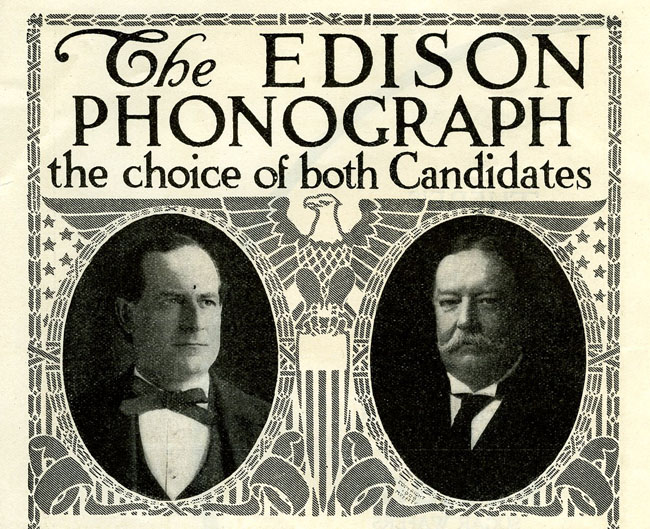
Probability:
Speech and other Utterances
.
Speech and other Utterances.
-- It will henceforth be possible to preserve for future generations
the voices as well as the words of our Washingtons,
our Lincolns, our
Gladstones, etc., and
to have them give us their " greatest effort" in every town and hamlet
in the country, upon our holidays.
With the invention of the phonograph
the possibility of hearing the recorded voices of the famous was wonderous.
Voices could also be preserved in family 'phonogram' albums along
with their photographs in their family photo albums. And for the nation
the voices of their greatest leaders would be available for any occasion
and preserved forever.
The July 13, 1878 edition of The
Graphic suggested that perhaps Parliament should use Edison's
Phonograph to record speeches and "reproduce every hum, and
ha!, and gasp, and stammer, and needless repetition, and grammatical
tangle."
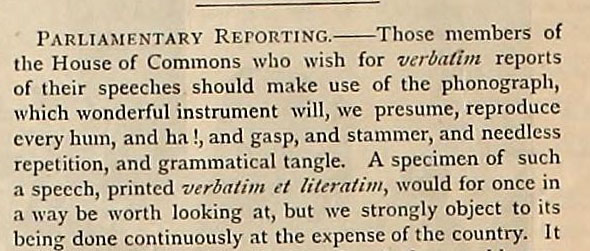
The
Graphic, July 13, 1878 p. 26
The importance to the family of recorded
sound versus photographs was clearly stated by Edison. In his prediction
titled Family Record
Edison wrote that "for the purpose of preserving
the sayings, the voices, and the last words of the dying member
of the family -- as of great men---the phonograph will unquestionably
outrank the photograph."
Although a phonograph could not capture
the voice of Washington or Lincoln, there would be early recordings
which re-enacted their famous words. (1)
Lincoln's speech at Gettysburg was performed
by Russell
Hunting on a brown wax cylinder for Columbia Phonograph Co between
1896 and 1900. Len Spencer performed this recitation on Edison
Gold Moulded Record Number 8154 in 1902 and Harry E. Humphrey
likewise performed Lincoln's speech on Edison
Blue Amberol Number 1651 in 1913. No actual Lincoln recording
exists, however, there is remarkably a photograph of Lincoln at the
Gettysburg cemetery on the occasion of his Gettysburg address. (1)
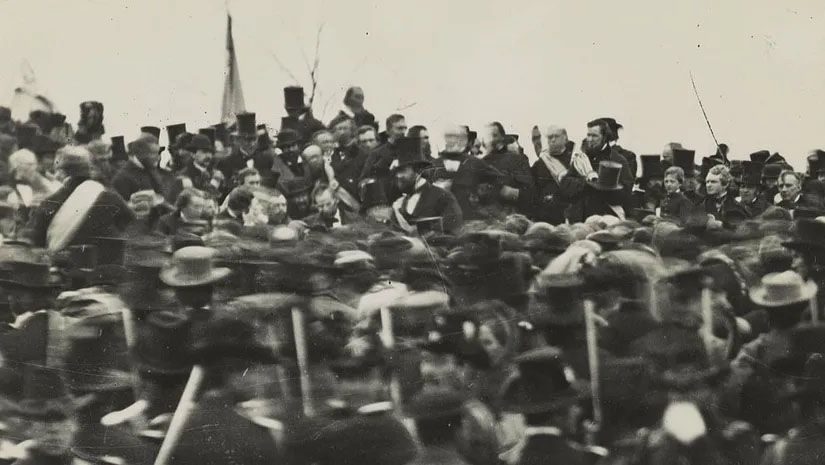
President Lincoln is seated on the platform,
no hat, a litte more than half way up from the bottom and about half
way in the middle (to the left of the man with tall hat standing in
the middle).
Harry E. Humphrey also performed "Washington's
Farewell Address" on Edison
Blue Amberol Number 1654 in 1913. See Wikipedia's
Popular Culture entry regarding Washington's Farewell Address
and "its return to public awareness" with the song "One
Last Time" in the 2015 Broadway musical "Hamilton, where
lines are sung by Washington and Hamilton from the end of the Address."
(2)
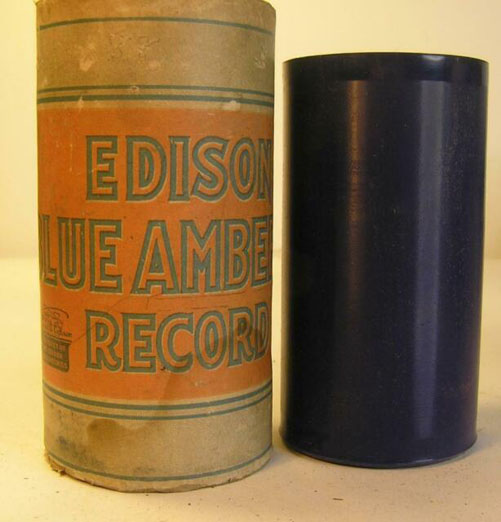
No photographs or phonograph recordings
in 1796, of course, but for context the Gilbert Stuart portrait of
Washington from 1796 dates closely to Washington's September 1796
publication of his "Farewell Address" which would be performed
on an Edison record by Humphrey in 1913.
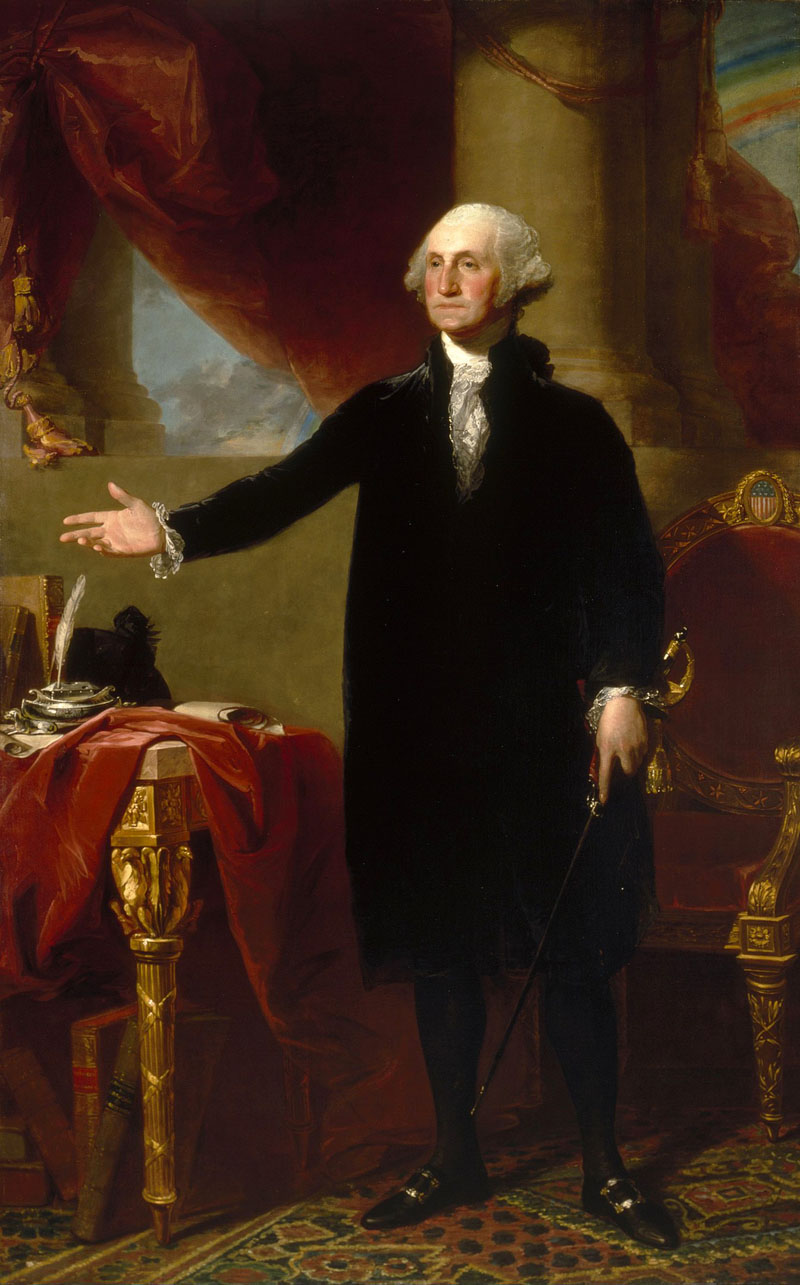
Edison's prediction regarding the preservation
of real voices of "great men," however, did take place early
in the phonograph's evolution with the voices of William
Gladstone, Alfred
Lord Tennyson, Robert
Browning, Prince Bismarck,
and Count Molke providing
evidence that images and voices by the 1890's could both be preserved
for posterity.
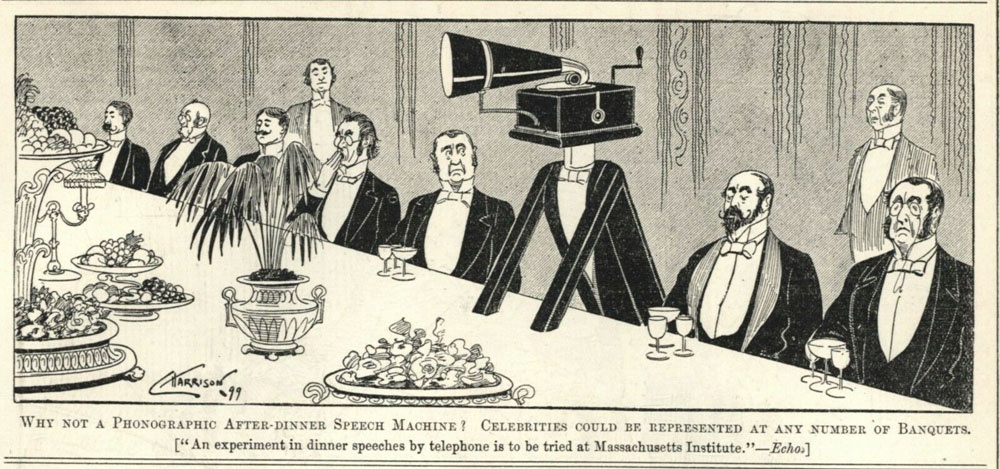
Punch
magazine, 1899
The 1908 Presidential
Election: Bryan vs. Taft
'Records' offered everyone
the means to hear the "exact words" of each Presidential
candidate
FACTOLA: "Now, for the first
time, one can introduce the rival candidates for the Presidency in
one's own home, can listen to their political views, expressed in
their real voices, and make comparison." The Edison Phonograph
Monthly, September 1908
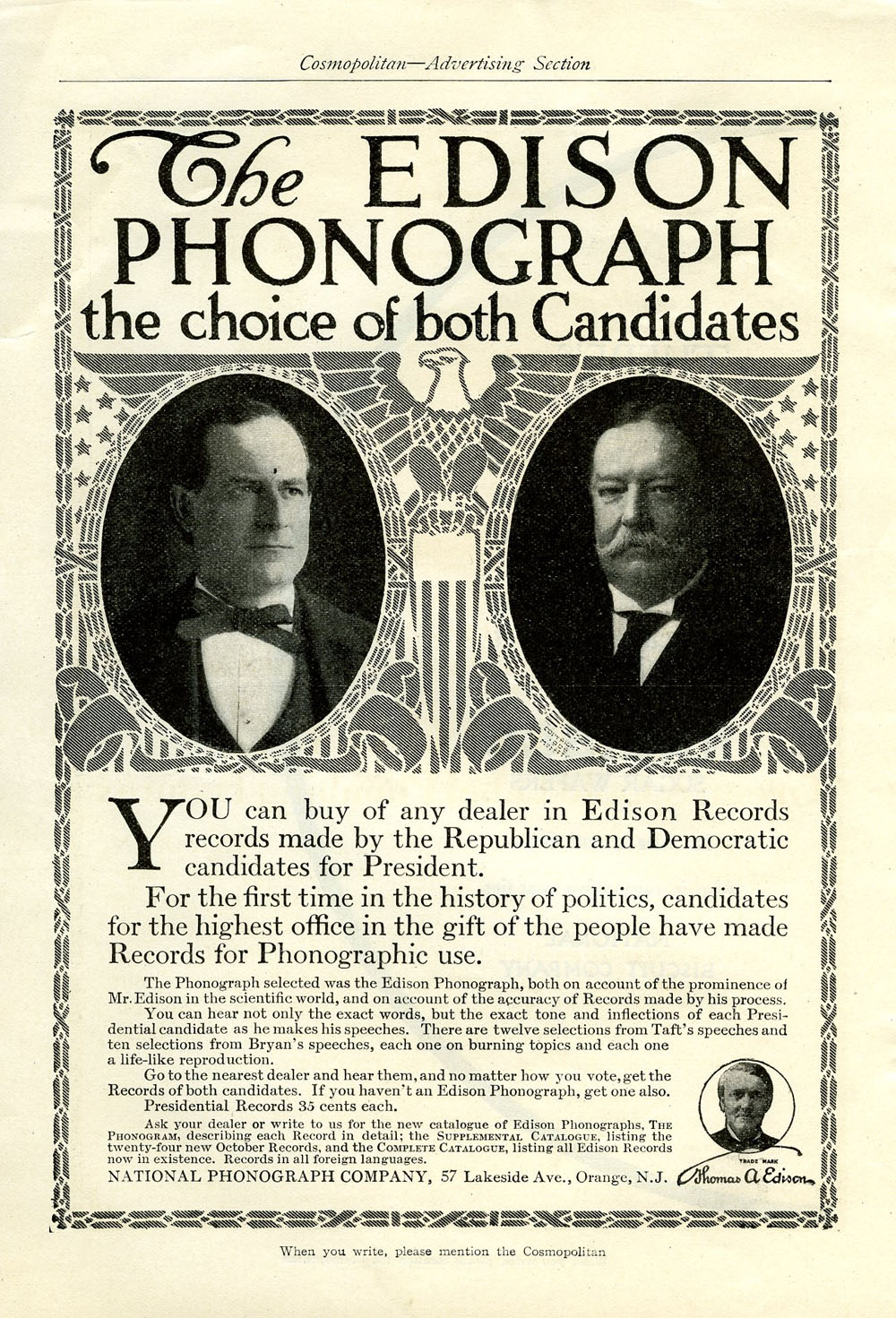
September 1908
Edison's recording and release in 1908
of ten speeches by William Jennings Bryan followed by twelve speeches
recorded by the Republican Presidential candidate William H. Taft,
provided the possibility that Edison had predicted in 1878 where citizens
could hear for themselves the voices and words of national leaders
and "have them give us their "greatest effort" in every town
and hamlet in the country..."
Ten Edison Records by William Jennings
Bryan, Edison Phonograph Monthly, June 1908
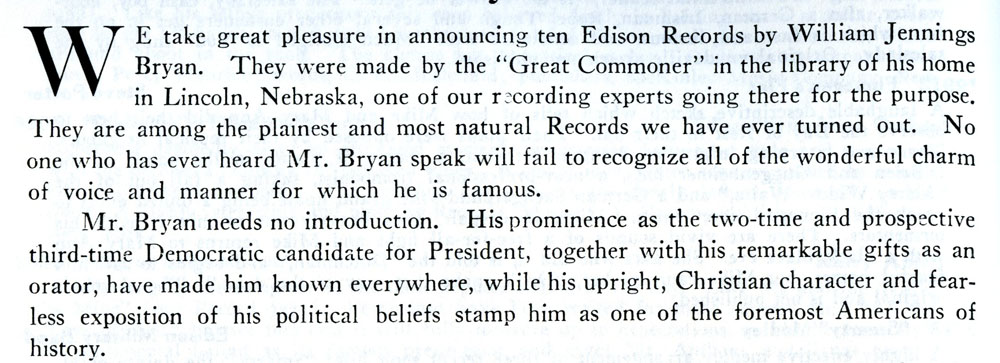
Recordings courtesy of UCSB Digital
Cylinder Archive
"Swollen Fortunes" by William
Jennings Bryan, Edison Record: 9914
"The Labor Question" by William
Jennings Bryan, Edison
Record: 9915
"The Railroad Question" by
William Jennings Bryan, Edison Record: 9916
"The Trust Question" by William
Jennings Bryan, Edison Record: 9917
"The Tariff Question" by William
Jennings Bryan, Edison
Record: 9918
"Popular Election of Senators"
by William Jennings Bryan, Edison Record: 9919
"Imperialism"
by William Jennings Bryan, Edison Record: 9920
"Guaranty of Bank Deposits"
by William Jennings Bryan, Edison
Record: 9921
"An Ideal Republic" by William
Jennings Bryan, Edison
Record: 9922
"Immortality" by William Jennings
Bryan, Edison
Record 9923
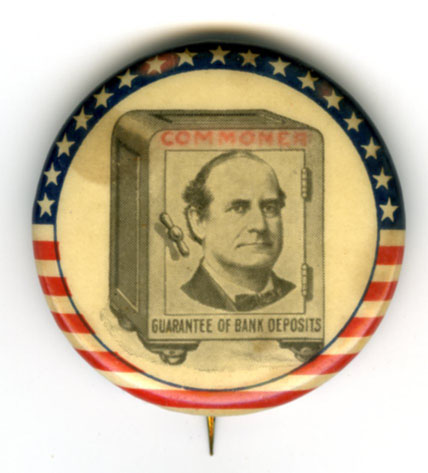
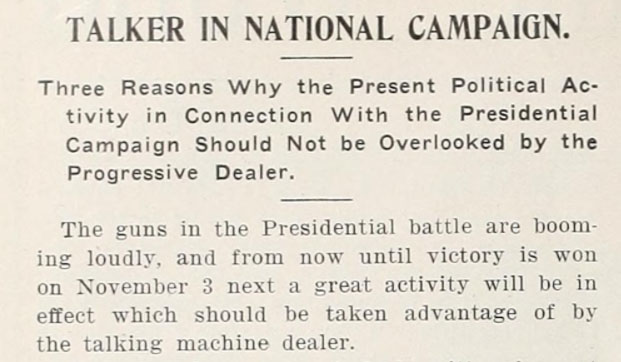
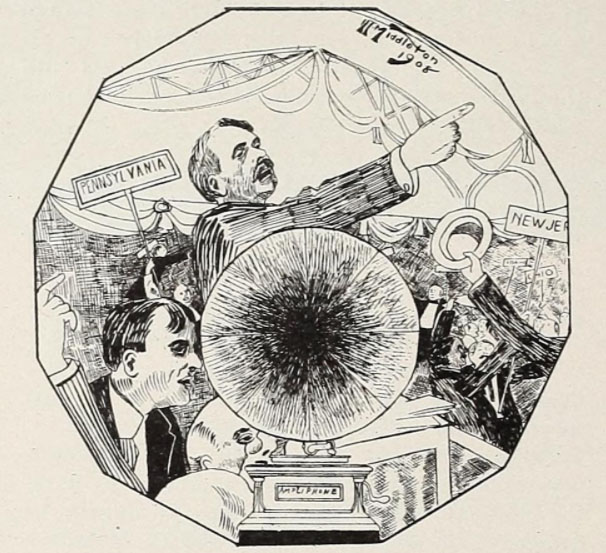
Introduction and illustration of The
Talking Machine World article addressed to phonograph dealers,
July 15, 1908
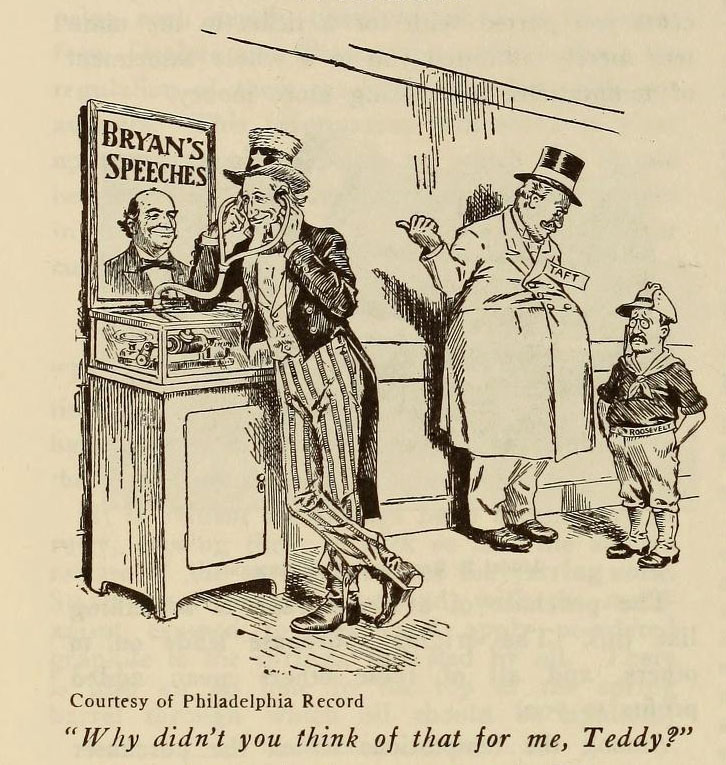
Edison
Phonograph Monthly, August 1908
William
Jennings Bryan, in his Presidential bid of 1908 recorded a series
of cylinder phonograph records for the Edison Phonograph Company.
In this cartoon, Taft is seen complaining that he has missed out on
this innovative campaigning.
The
Edison Phonograph Monthly in September 1908, however, announced
the release of 12 Edison Records by William H. Taft made at Virginia
Hot Springs, after Mr. Taft delivered his speech of acceptance at
Cincinnati. The EPM called this an announcement of great importance,
noting that "no matter how the November election may result we
shall have Records by the next President. This makes new history.
It indicates progress."
"Now, for the first time, one
can introduce the rival candidates for the Presidency in one's own
home, can listen to their political views, expressed in their real
voices, and mak comparison."
"We are proud that of all talking
machines, the Edison was the first choice of both candidates for
reaching the American public." The Edison Phonograph Monthly,
September 1908, p.19
In the December 1908 issue of The
Edison Phonograph Monthly it was observed that with the Election
Day having passed "The Taft Records are the first in the history
of the world to be made by the head of a great government. After March
4th next the owner of one of these Records can say with no little
pride: "This is a Record made by the President of the United
States....The Records of his voice will become more and more interesting,
and they will have a value that could not be estimated if it were
not possible to duplicate them."
Twelve Edison Records by William H.
Taft, Edison Phonograph Monthly, September 1908
Recordings courtesy of UCSB Digital
Cylinder Archive
"Foreign Missions" by William
H. Taft, Edison
Record 9996
"Irish Humor" by William H.
Taft, Edison Record 9997
"Republican and Democratic Treatment
of Trusts" by William H. Taft, Edison
Record 9998
"The Rights of Labor" by William
H. Taft, Edison
Record 9999
"Unlawful Trusts" by William
H. Taft, Edison
Record 10000
"Function of Next Administration"
by William H. Taft, Edison Record 10001
"Roosevelt Policies" by William
H. Taft, Edison
Record 10002
"The Philippines" by William
H. Taft, Edison Record 10003
"Enforced Insurance of Bank Deposits"
by William H. Taft, Edison Record 10004
"Jury Trial in Contempt Cases"
by William H. Taft, Edison
Record 10005
"The Farmer and the Republican
Party" by William H. Taft, Edison Record 10006
"Rights and Progress of the Negro"
by William H. Taft, Edison
Record 10007
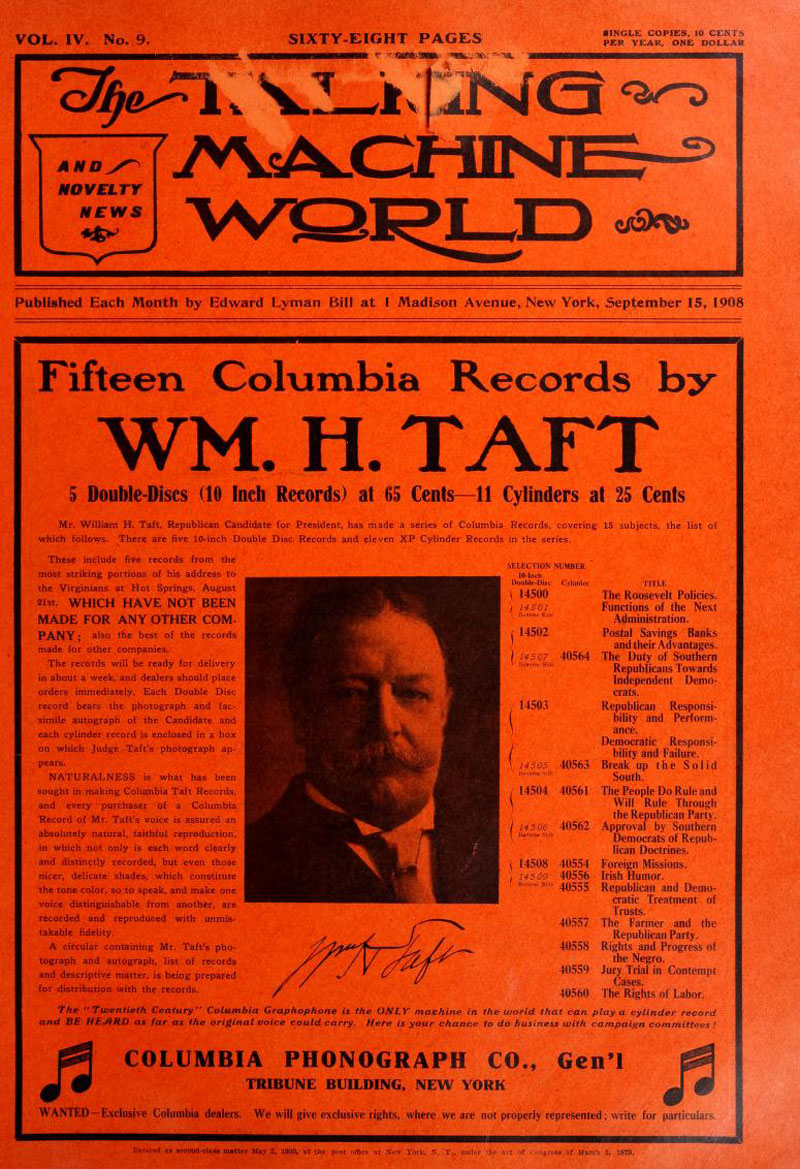
The Talking
Machine World cover, September 15, 1908
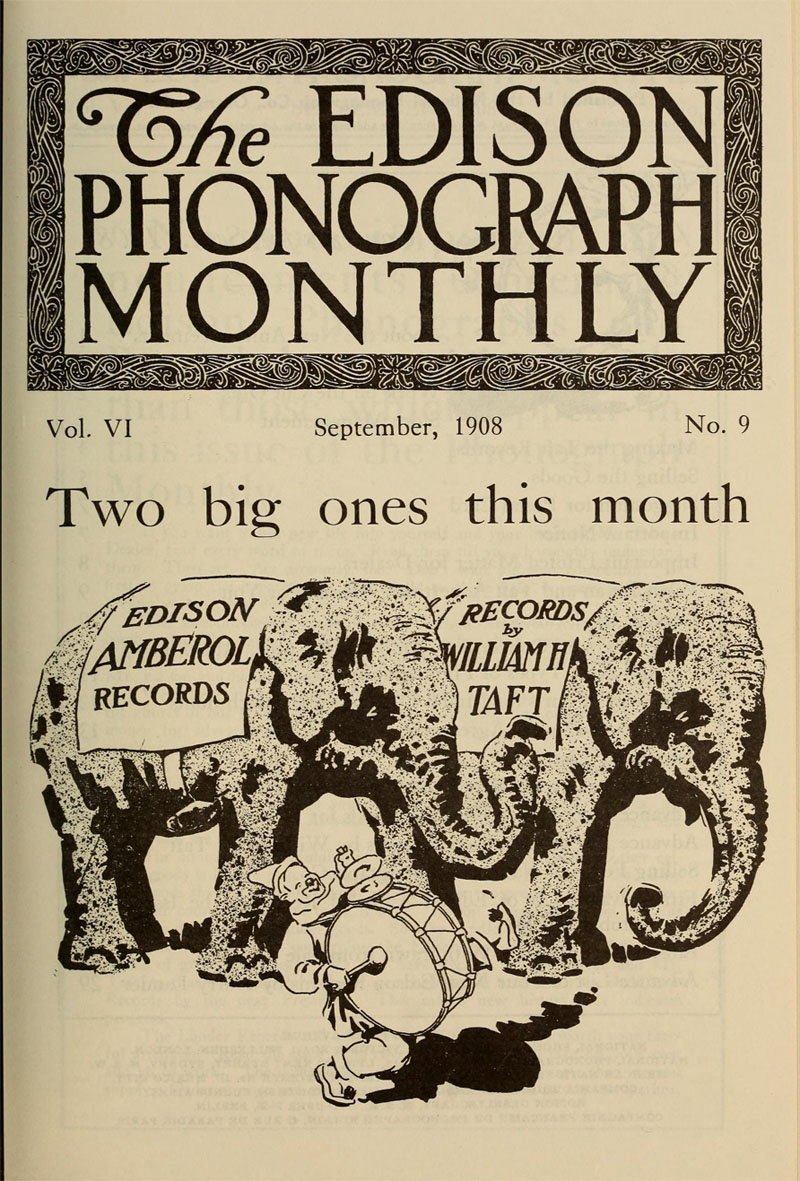
Release of Edison's Taft
Records, The Edison Phonograph Monthly, September 1908
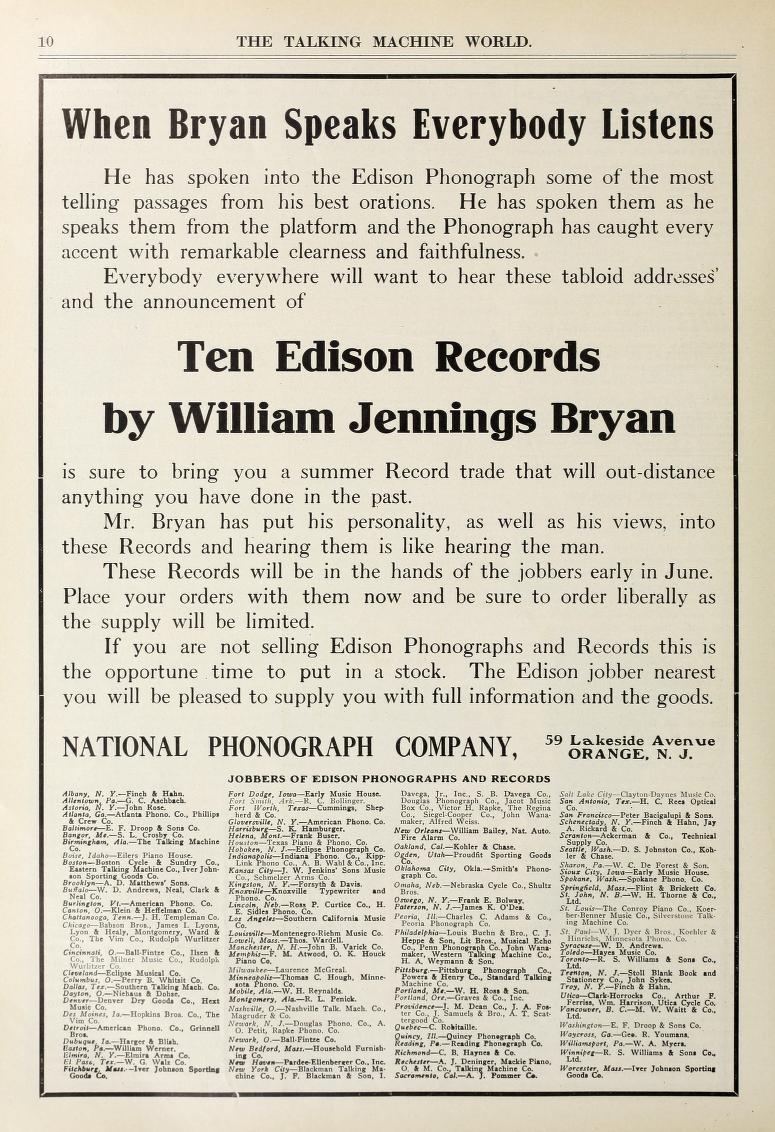
Ten Edison Records
by William Jennings Bryan, June 15, 1908 The Talking Machine World
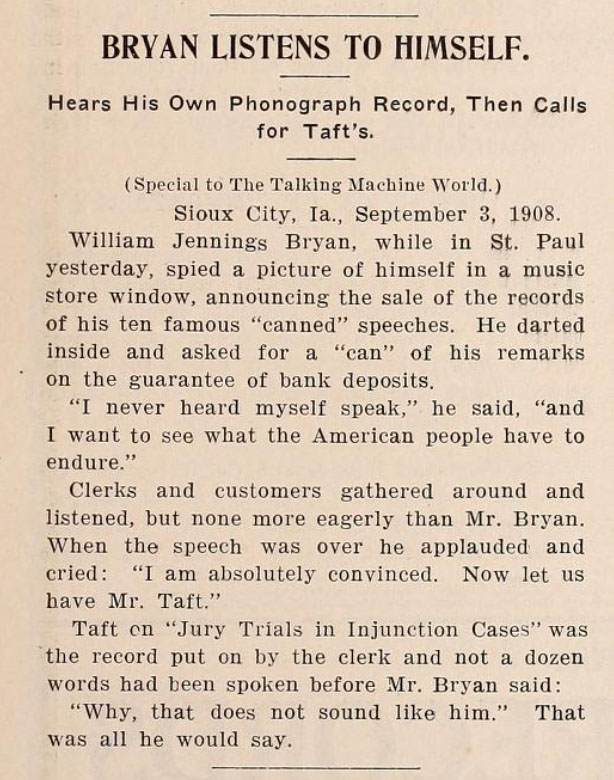
The Talking Machine
World, September 15, 1908
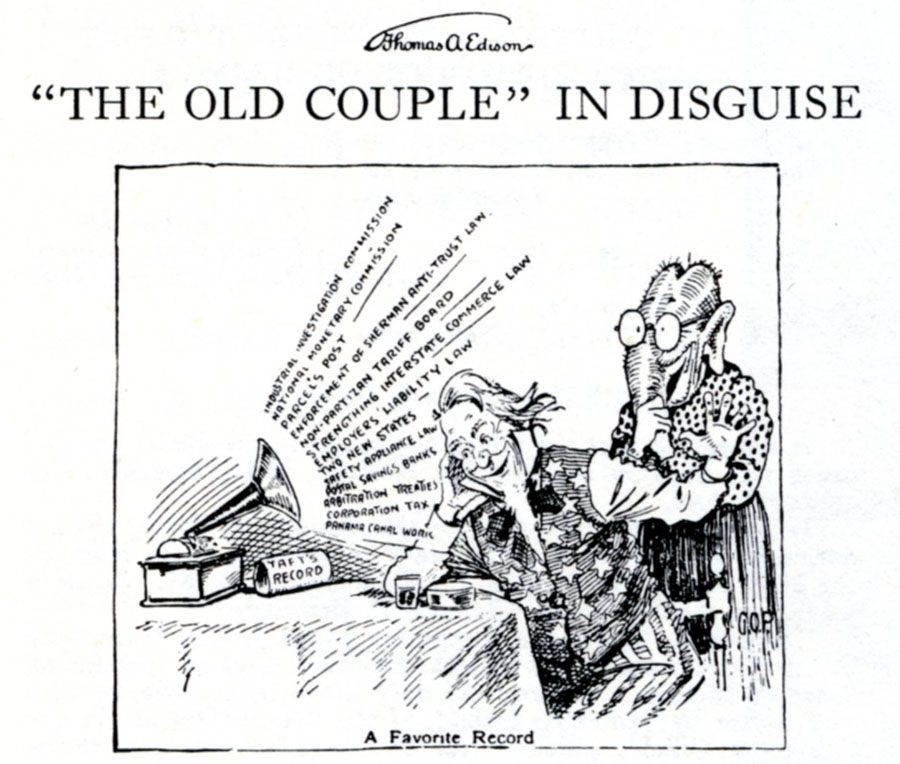
"A Favorite
Record - Taft Records" The Edison Phonograph Monthly, May
1912
For more information about
"The Old Couple" see The
Phonograph
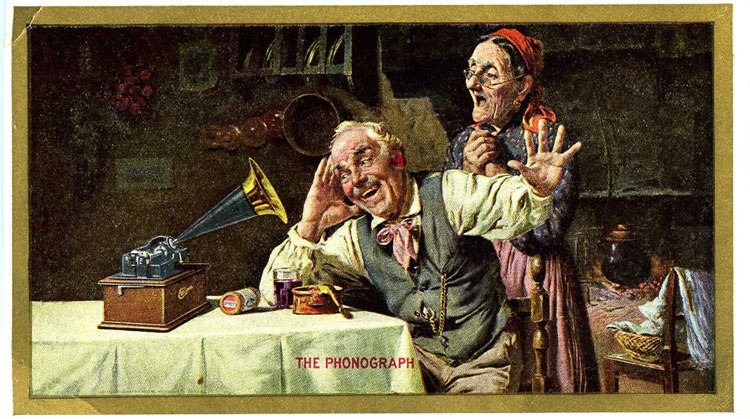
"The Phonograph,"
Edison Form 935 (PM-2111)
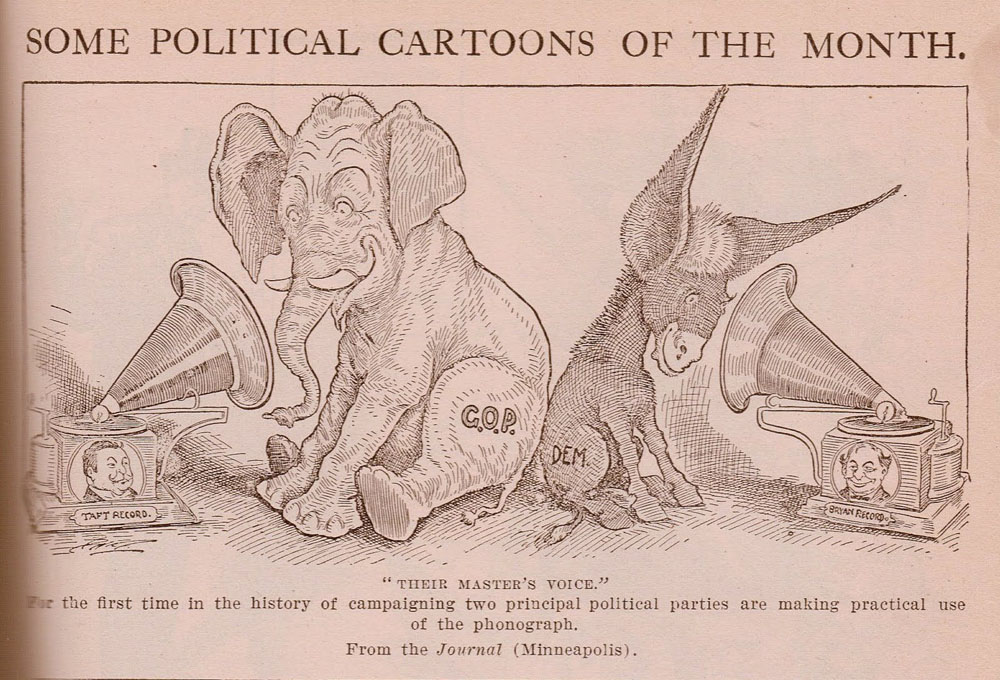
The Presidential
candidates of 1908 were on many covers of Puck and Judge
magazines with Bryan usually illustrated unfavorably as had also been
the case in 1896 and 1900.
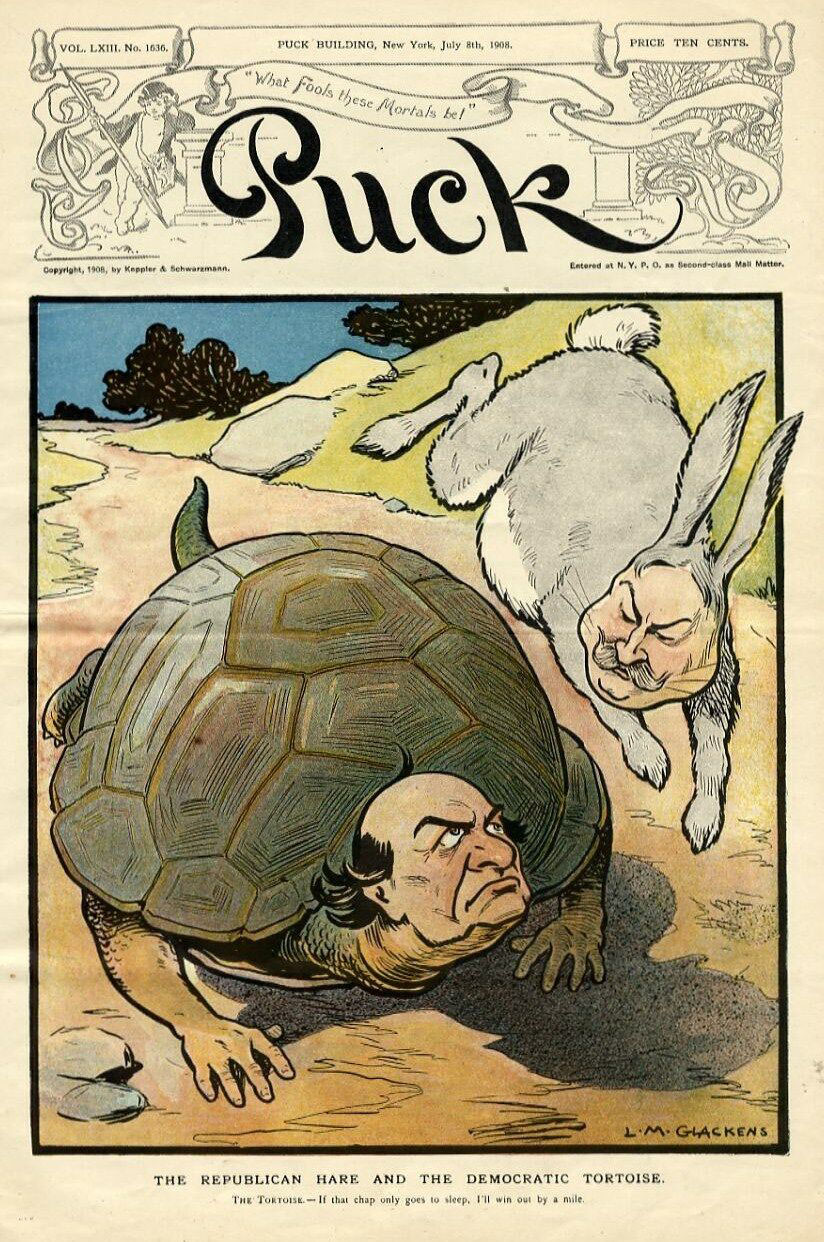
Puck magazine, July
8, 1908
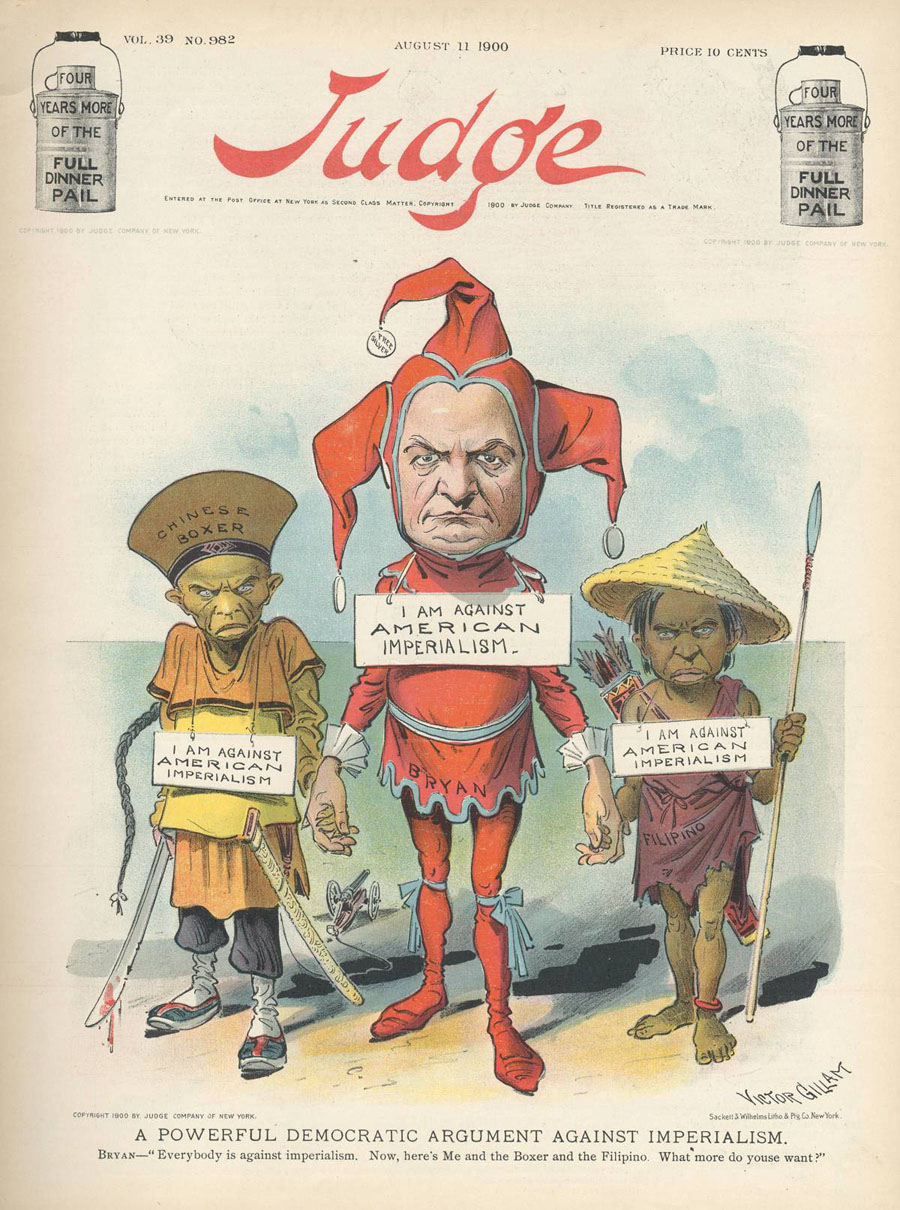
Imperialism, Judge
magazine, August 11, 1900
A record titled "Imperialism"
by William Jennings Bryan was available for the 1908 election to hear
Bryan's position.
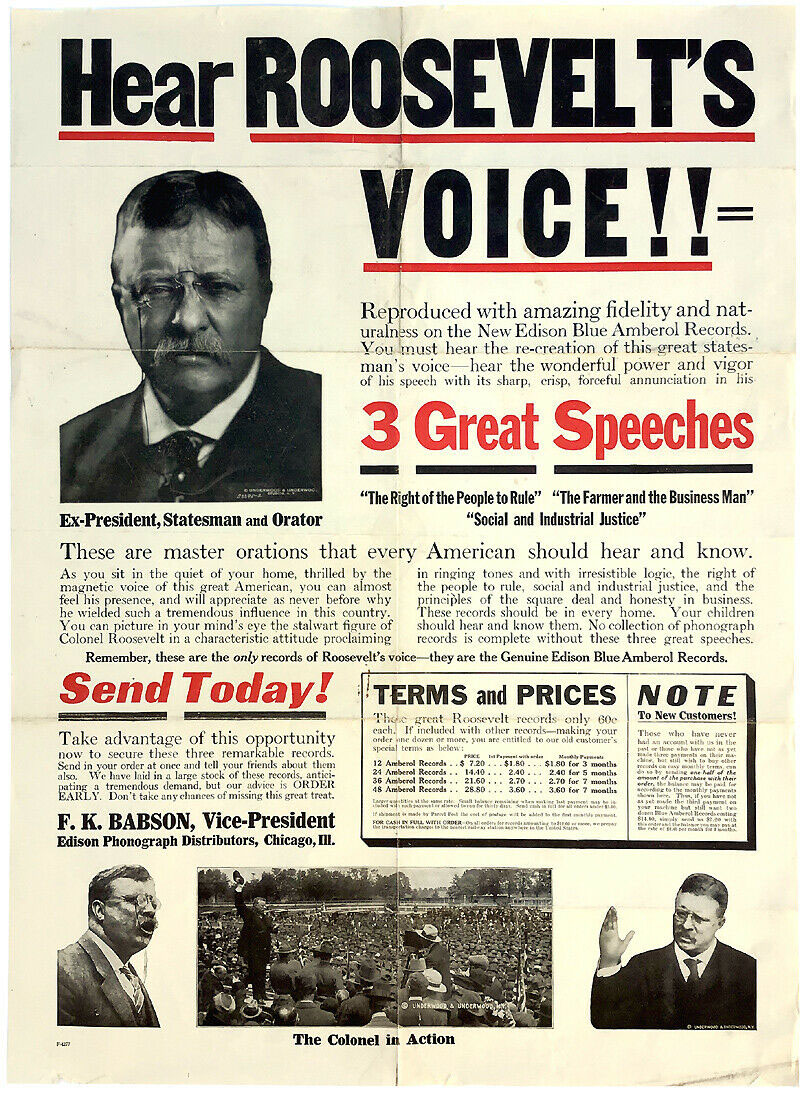
Edison Amberol Records,
ca. 1918 advertisment

The
Gladstone Recording
The Gladstone recording was made by
Colonel Charles Gouraud who lived in London originally to promote
the Edison Telegraph System. Edison had sent Gouraud his "Perfected
Phonograph" and on August 18, 1888 Gouraud introduced that machine
to the London Press.
On December 18, 1888 Gouraud recorded
an introductory message to Edison and then introduced Mr. Gladstone
who recorded
a message to Edison.
Transcript of Charles Gouraud's introduction
and Gladstone's message to Edison (courtesy of
transformingArt)
CHARLES GOURAUD:
London, 18th December 1888. To Edison
from Colonel Gouraud, introducing Mr Gladstone. The Phonograph Salutation.
The latest-born of science and American genius bends its knee of steel
and bows its neck of iron in reverential homage before the veteran
statesman of England. Mr Gladstone, the phonograph salutes you, and
through the medium of the phonograph, Mr Edison greets you. Now, Edison,
listen to a voice that has electrified its generation - the voice
of William Ewart Gladstone;
GLADSTONE:
Dear Mr Edison, I am profoundly indebted
to you for, not the entertainment only, but the instruction and the
marvels of one of the most remarkable evenings which it has been my
privilege to enjoy. The request, that you have done me the honour
to make - to receive the record of my voice - is one that I cheerfully
comply with so far as it lies in my power; though I lament to say
that the voice which I transmit to you is only the relic of an organ,
the employment of which has been overstrained. Yet I offer to you
as much as I possess and so much as old age has left me, with the
utmost satisfaction, as being, at least, a testimony to the instruction
and delight that I have received from your marvellous invention. As
to future consequences it is impossible to anticipate them. All I
see is that wonders upon wonders are opening before us. Your great
country is leading the way in the important work of invention. Heartily
do we wish it well. And to you, as one of its greatest celebrities,
allow me to offer my hearty good wishes and earnest prayers that you
may long live to witness its triumphs in all that appertains to the
well-being of mankind. William Ewart Gladstone.

The Thomas Edison National Historic
Park (NPS) has a page titled Documentary
Recordings and Political Speeches which has a number of pre-1915
recordings.
Recording of Prince Bismark,
October 7, 1889 in Berlin, Germany and Count Molke, October
21, 1889 in Kreisau, Prussia by Theo Wangemann.
In an article available on the Thomas
Edison National Historical Park NPS website titled "Prince
Bismarck and Count Moltke Before the Recording Horn Prince Bismarck
and Count Moltke Before the Recording Horn: The Edison Phonograph
in Europe, 1889-1890 by Stephan Puille [translation by Patrick
Feaster]" the voices of Bismark, Moltke and other recordings
made by Theo Wangemann on his 1889 European recording tour can be
hard.
There is also a link to a biography
of Theo
Wangemann by Patrick Feaster that is excellent.
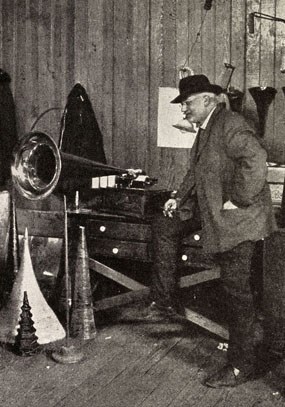
Theo
Wangemann in the Edison Laboratory Music Room, circa May 1905 (Courtesy
of NPS)

Phonographia
|

























